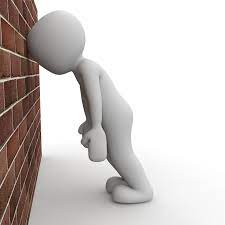And Never Talk Through Your Teeth
- Peter Byrne

- 17 giu 2023
- Tempo di lettura: 4 min
Aggiornamento: 18 giu 2023
Hold your tongue, clam up, keep it to yourself, don’t spill the beans—wait a sec—no, no, that’s a cliché too. How to speak or write at all without them?
“Never do it—not even in conversation. Never say (let alone write) You know what? or I don’t think so or Hello? or Hey (jocularly, as in ‘But hey, we all make mistakes’).”
That was the advice Martin Amis gave in his Inside Story, 2020. He had been fighting the good fight [arguing for] for years. He published The War Against Cliché in 2001, 506 battle weary [laborious] pages. He did praise, however, the creators of the hackneyed old friends and only condemned their reemploy:
“All credit to whoever coined no-brainer and (I suppose) to whoever coined go ballistic and Marxism lite and you rock and eye-popping and jaw-dropping and double whammy and all the rest of them.”
And the enemy is gaining strength, cliche is overtaking cliché in the organs of the Fourth Estate [newspapers]. Let’s pause and get ourselves straightened out [relax]. Say I’m teaching English to foreign speakers who are not at the highest level. On an exam paper, one of them comes up with [writes] at this moment in time. I give said student a slap on the back [nod of approval]. He or she has made a giant step [entry] into the English-speaking world and that, after all, is the object of our mutual exercise. However, if I’m teaching students at the highest level, I’d tut-tut [disapprove], draw a line through the trite expression, and note, “just say nowadays or even now.”
Are clichés really the kiss of death? [always negative]. That, it seems, depends. It’s one thing for an inventive stylist writing a novel, a kind of poet, like Martin Amis, and another thing for speakers and writers trying simply to communicate with their fellows.
We pass over the gossipy question of Martin’s victimisation by a generation of Grub Street [hack] satirists tagging him with cliché monikers like “Smarty Anus, ” “Little Keith,” after a dwarf in his early book, or, nepo baby [abuser of nepotism] as the author of an apocryphal My Struggle. These may well have soured him on clichés in general. He can, though, sometimes see them as useful. He tells us in The War Against Cliché that James Joyce’s “Ulysses is about cliché. It is about inherited, ready-made formulations, fossilised metaphors—most notably those of Irish Catholicism and anti-Semitism. After all, prejudices are clichés: they are secondhand hatreds.”….Of Course, “Joyce never uses a cliché in innocence.” He makes them serve his thought.
But never mind the maestros of language. What about ordinary hopeful communicators who find hand-me-down expressions the only alternative to silence for a long moment while they try to remember the latest buzzword? Rivka Galchen speaks for them in the New York Times and notes the special relationship between non-native speakers and clichés: “Like many people with family for whom English is not their first language, I’ve always had a soft spot for clichés.” She goes on:
“Clichés are like the old talismans dug up at an archaeological site. They often endure even when the times and places that produced them have passed on…. Why is lyrical something we wax, and why is a whip something we want to be as smart as? … None of these things happen any more. But we still use the old phrases, like hikers unrolling sleeping mats in the ancient temple at Petra.”
The writer Leslie Jamison, also in the NYTimes, feels neutrality not war should be our foreign policy with ready-mades:
“Clichés work against us when they replace our tongues entirely, when the greeting card messages supplant our own. They work best when they link our singular experiences rather than efface them — when they function as dangling strings around which the rock candy of individual experience crystallizes.”
But hold your horses, isn’t that bending over backwards? Without pretending that tried and true sayings are the best thing since sliced bread, when an ordinary Joe is banging his head against a brick wall, at his wit’s end, he’s right to call a spade a spade and nix the high and mighty. Rock candy crystallised? That’s shooting for the moon and skating on thin ice, chomping at the bit. It rings a bell with no one. Best stop and smell the roses—keep it simple stupid—you’re talking to a man of few words. Not a hope in hell he knows rock candy from rock-hard Gibraltar. It’s over his head. Instead, go with the flow give him a good as gold, down to earth, on the money cliché. Easy as pie. Don’t even gild the lily or beat around the bush, but fly the coop, make it the real deal, a cliche unaccented and free as a bird in the great blue yonder. In a word, you will never have to eat your words. I swear, mark my word. Needless to say, you will add insult to injury to the ghost of that pain in the butt, Little Martin.
(With a knee bent in thanks to “681 Clichés to Avoid in Your Creative Writing”.)









Commenti